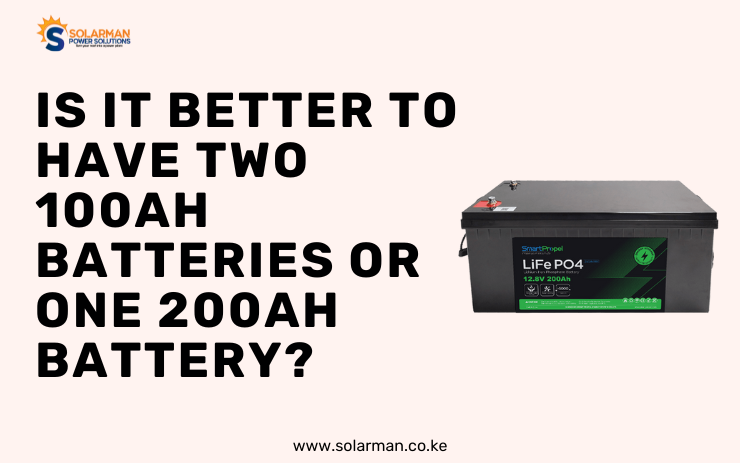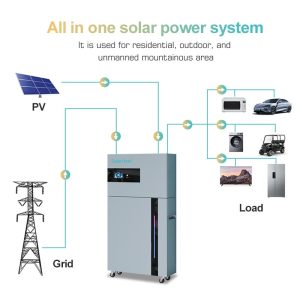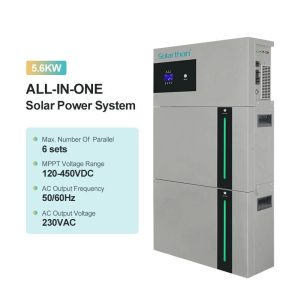When setting up a solar system, one of the most important decisions is choosing the right battery setup for your energy storage needs.
You might be asking yourself, “Should I get two 100Ah batteries or one 200Ah battery?” The answer depends on your specific needs, budget, and how you plan to use your solar system.
In this article, we’ll explore the differences between the two setups, the pros and cons of each, and how to decide what’s best for your system.
At Solarman, we provide high-quality solar batteries and expert advice to help you make the right choice for your home or business.
What Does Battery Capacity Mean?
Battery capacity is measured in amp-hours (Ah) and indicates how much electricity the battery can store.
- 100Ah Battery: Stores enough energy to supply 100 amps for 1 hour or 10 amps for 10 hours.
- 200Ah Battery: Stores twice as much energy, providing 200 amps for 1 hour or 20 amps for 10 hours.
Both setups (two 100Ah batteries or one 200Ah battery) offer the same total capacity of 200Ah, but how they perform depends on the configuration and your energy needs.
What Are the Key Differences Between Two 100Ah Batteries and One 200Ah Battery?
Physical Size and Weight
- Two 100Ah Batteries: Easier to handle and install because each battery is lighter.
- One 200Ah Battery: Heavier and bulkier, requiring more space and effort to move.
Cost
- Two 100Ah Batteries: May cost slightly more due to additional connectors and cables.
- One 200Ah Battery: Can be more economical overall.
Performance and Configuration
- Two 100Ah Batteries: Can be wired in series (to increase voltage) or parallel (to increase capacity). This flexibility is useful for different solar setups.
- One 200Ah Battery: Provides a simpler setup with fewer connections, reducing potential points of failure.
Maintenance
- Two 100Ah Batteries: Require monitoring of both batteries to ensure equal performance.
- One 200Ah Battery: Easier to maintain as there’s only one unit to monitor.
When to Choose Two 100Ah Batteries
1. Flexibility in Configuration
If you need to increase voltage, you can wire two 100Ah batteries in series. For example, two 12V 100Ah batteries can be wired to produce 24V, which is useful for higher-voltage systems.
2. Easier Installation in Tight Spaces
Two smaller batteries may fit better in tight or irregularly shaped spaces compared to one large battery.
3. Easier Handling
If you need to move the batteries frequently, the lighter weight of two 100Ah batteries makes them more manageable.
When to Choose One 200Ah Battery
1. Simpler Setup
A single battery means fewer cables and connections, reducing installation time and complexity.
2. Lower Maintenance
With one battery, you don’t have to worry about balancing the charge between two units.
3. Cost Efficiency
In some cases, a single 200Ah battery may be more cost-effective than purchasing two 100Ah batteries and additional accessories.
4. Space Efficiency
If you have enough room for a larger battery, a single 200Ah unit can simplify storage and management.
Which Setup Is Better for Solar Systems?
Advantages of Two 100Ah Batteries:
- Flexibility: Can be configured for 12V or 24V systems.
- Redundancy: If one battery fails, you can still use the other.
- Easier Transport: Smaller and lighter units are easier to move or replace.
Advantages of One 200Ah Battery:
- Simpler Installation: Fewer components mean a quicker setup.
- Consistency: No need to balance charge or performance between two batteries.
- Space Savings: Can take up less space in certain setups.
The best choice depends on your specific energy needs and available space.
- Solar Kit
10kW Complete Solar System
KSh 600,000Original price was: KSh 600,000.KSh 583,000Current price is: KSh 583,000. Add to cart - Solar Kit
5kW Complete Solar System – Home Energy Solution
KSh 380,000Original price was: KSh 380,000.KSh 299,000Current price is: KSh 299,000. Add to cart
Real-Life Examples of Battery Usage
Scenario 1: Small Solar System
A small household system with lights, a TV, and phone chargers may only need one 200Ah battery for simplicity.
Scenario 2: Flexible Configuration Needs
A medium-sized system powering a fridge, WiFi router, and lights could benefit from two 100Ah batteries wired in series for a 24V system.
Scenario 3: Limited Space
If space is tight, two smaller 100Ah batteries might fit better than one large 200Ah battery.
Why Choose Solarman for Your Solar Battery Needs?
At Solarman, we understand the importance of finding the perfect battery setup for your solar system. Here’s why customers trust us:
- Wide Selection: We offer both 100Ah and 200Ah batteries, including gel and lithium-ion options.
- Expert Guidance: Our team helps you choose the best configuration for your energy needs.
- Affordable Prices: Competitive pricing for high-quality products.
- Professional Installation: Safe and reliable setup by our experienced technicians.
- Ongoing Support: We provide maintenance tips and assistance to keep your system running smoothly.
How to Maintain Your Solar Batteries
Proper care ensures your batteries last longer and perform efficiently:
- Monitor Charge Levels: Avoid overcharging or completely draining the batteries.
- Clean Connections: Check and clean terminals regularly to prevent corrosion.
- Store in a Cool Place: High temperatures can reduce battery lifespan.
- Inspect Regularly: Look for signs of wear, such as cracks or leaks.
FAQs
1. Is it better to have two 100Ah batteries or one 200Ah battery?
It depends on your needs. Two 100Ah batteries offer flexibility, while one 200Ah battery is simpler to install and maintain.
2. Can I mix 100Ah and 200Ah batteries in the same system?
It’s not recommended, as differences in capacity can lead to uneven charging and reduced battery life.
3. How long does a 200Ah battery last?
The runtime depends on your energy usage. For example, it can power a 100W appliance for about 20 hours.
4. How much does a 200Ah battery cost in Kenya?
Prices vary by type and brand. At Solarman, we offer competitive prices for high-quality 200Ah batteries.
5. Which type of solar battery is best?
Lithium-ion batteries are the most efficient and long-lasting, but gel and lead-acid batteries are more affordable for smaller systems.





